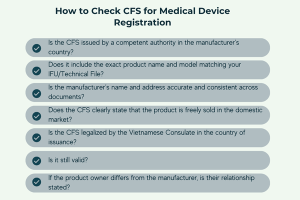- If you have any questions, please contact us!
- +84 965 624 065
- info@greennrj.com.vn

Avoid 3-Month Delays in Class C and D Medical Device Registration in Vietnam
July 19, 2025
Clear Difference Between Health Supplements and Supplemented Foods (2025 Update)
August 6, 2025Introduction
The Certificate of Free Sale (CFS) serves as official proof that your medical device is legally marketed and sold in its country of origin. In Vietnam, however, this document must meet strict criteria—both in content and legal status. If your CFS fails to comply, your entire registration dossier could be rejected, causing significant delays.
In this article, you’ll learn:
-
What a valid CFS must include
- How to Check CFS for Medical Device Registration
-
The most common mistakes to avoid
What Are the CFS Requirements for Medical Devices in Vietnam?
To be accepted during medical device registration in Vietnam, a valid CFS for medical device registration must include the following information:
| Required Information | Description |
|---|---|
| Issuing authority or organization | The full name of the competent authority or government body that issued the CFS. |
| CFS number and date of issuance | Reference number and date must be clearly displayed on the certificate. |
| Product name | Exact name of the medical device or goods listed in the application documents. |
| Product type or classification | Define the category of the product (e.g., diagnostic, implant, consumable). |
| Manufacturer’s name and address | Must match the technical documents submitted for registration. |
| Free sale confirmation | A clear statement confirming the product is legally sold in the issuing country. |
| Authorized signature and official seal | Must include the name and signature of the authorized signatory and official stamp. |
These are the minimum medical device CFS document requirements recognized under the Certificate of Free Sale Vietnam regulations.
How to Check CFS for Medical Device Registration: The Essential Checklist
To avoid delays or rejections during the registration process, it’s essential to understand how to check CFS for medical device registration properly. Use this updated CFS checklist for medical device registration in Vietnam to ensure full compliance:

Overlooking any of these points can result in rejection. Understanding why CFS is rejected in Vietnam often comes down to minor details. Proper document review is crucial for securing CFS approval for imported medical devices.
Common Certificate of Free Sale (CFS) Mistakes in Medical Device Registration in Vietnam
1. Missing or Incorrect Product Information on CFS (Product Name, Model, Domestic Market Availability)
This is a fundamental yet highly common error. According to Clause 3, Article 10 of Decree 69/2018/ND-CP and Vietnam’s medical device regulations, primarily Decree 98/2021/ND-CP, the CFS must clearly state:
- The product is manufactured and permitted for free sale in the domestic market of the manufacturing country or the country issuing the CFS. The standard phrasing should be: “Freely sold in domestic and overseas markets.” If the CFS only states “permitted for export” without confirming domestic circulation (a common error with Korean CFS), the dossier will not be accepted.
- Missing Model Name or product name that does not match other documents. Information on the CFS must be completely consistent with other documents in the medical device declaration/circulation dossier.
2. Incorrect or Missing Seal/Stamp of the Issuing Authority: A Decisive Factor for CFS Validity
The validity of the seal and the authority of the issuing body on the Certificate of Free Sale (CFS) is not merely a formality; it is a crucial element that confirms the legal value of the document. An incorrect or missing seal can immediately lead to the rejection of your medical device registration dossier.
To ensure the origin and quality of imported medical devices, the Ministry of Health of Vietnam has specific regulations regarding the recognition of foreign CFS issuing authorities.
Example with Chinese CFS: According to the provisions of Decree 98/2021/ND-CP, the Vietnamese Ministry of Health only accepts two specific types of seals on a CFS from China:
- Seal of Provincial/City Medical Products Administrations: These are local-level regulatory bodies responsible for licensing and managing medical products within their respective provinces or centrally-governed cities in China.
- Illustrative example: A CFS for a medical device manufactured in Shanghai might bear the seal and signature of the “Shanghai Medical Products Administration.” This seal, clearly showing the agency’s name and often an official emblem, will be recognized as valid by the Vietnamese Ministry of Health. This level of administration is closely aligned with the manufacturer, ensuring the authenticity of product information in that specific locality.
- Seal of the National Medical Products Administration (NMPA): This is the highest regulatory authority for pharmaceuticals and medical devices in China. A CFS issued or certified by the NMPA will always be accepted, as it represents the central authority with national jurisdiction.
- Illustrative example: A CFS for a product with nationwide circulation or requiring the highest level of confirmation might bear the seal of the “National Medical Products Administration (NMPA).” The NMPA’s seal signifies authenticity at a federal level, widely recognized internationally.
Examples of Seals/Authorities Not Accepted in Vietnam: In some cases, even if an authority appears to be a government body or a reputable organization in its home country, it may not be accepted by the Vietnamese Ministry of Health for the purpose of issuing a CFS:
- CFS from Japan issued by OMET A (Overseas Medical Equipment & Technology Association): OMET A is a reputable association of Japanese medical device manufacturers and exporters. However, under current Vietnamese regulations, OMET A has not been recognized by the Vietnamese Ministry of Health as an official CFS issuing authority. This might be because the organization is an association rather than a state management agency directly under the Japanese government. Therefore, a CFS bearing OMET A’s seal will be rejected when submitted in Vietnam.
- Illustrative example: If you are importing a medical device from Japan and your CFS has OMET A’s seal, you will need to request the manufacturer to provide a CFS issued by a competent state management agency equivalent to the Ministry of Health of Japan, such as the Ministry of Health, Labour and Welfare (MHLW) of Japan, or a pharmaceutical and medical device regulatory body directly under MHLW.
- CFS issued by the China Chamber of Commerce for Import and Export of Medicines & Health Products: Similar to OMET A, the Chamber of Commerce is a trade promotion organization, not a state management agency with the authority to license the circulation of medical products. Although it is an important organization in the trade sector, a CFS bearing its seal will not be accepted by the Vietnamese Ministry of Health for medical device registration purposes.
- Illustrative example: A Vietnamese importer receiving a CFS from a Chinese partner with the “China Chamber of Commerce…” stamp will certainly have their dossier rejected. The importer must request a CFS with the seal of the NMPA or a Provincial Medical Products Administration as mentioned above.
Important Note: To avoid risks and unnecessary dossier amendments, importing businesses should proactively work with their manufacturers or suppliers abroad. Ensure that the CFS is issued by the correct competent authority recognized by the Vietnamese Ministry of Health and bears a clear, valid seal. This will significantly save time and costs throughout the entire dossier preparation and submission process.
3. Lack of Consular Legalization for the CFS
A CFS without consular legalization is considered legally invalid in Vietnam and will be rejected. This step is mandatory.
What is Consular Legalization? It is the official process where the Vietnamese Embassy or Consulate in the country that issued the CFS verifies the authenticity of the seal, the signature, and the signatory’s title on the document. This verification confirms to the Vietnamese authorities that the CFS is a legitimate document issued by a competent authority in the country of origin.
4. Expired Certificate of Free Sale (CFS)
Using an expired CFS is a common and critical error that leads to automatic rejection. The CFS must be valid at the time of dossier submission to the Vietnamese authorities.
Key Validity Rule: According to regulations, a CFS is generally considered valid for 24 months from its date of issuance, unless a shorter validity period is explicitly stated on the certificate itself. Always check the issuance and expiry dates before submission.
5. CFS Does Not Clearly Show the Relationship Between Manufacturer and Medical Device Owner
One of the complex errors that often causes difficulties for businesses, especially with OEM (Original Equipment Manufacturer) or Private Label production models, is when the Certificate of Free Sale (CFS) does not clearly demonstrate the legal relationship between the actual manufacturer and the legal owner of the medical device. Vietnamese regulatory authorities demand this transparency to ensure product traceability and legal accountability.
Common Scenarios and Regulatory Requirements:
There are two primary scenarios that frequently lead to dossier rejection:
- CFS Only Shows Manufacturer’s Information but is Issued to a Different Medical Device Owner:
- Problem: In this case, the CFS only lists the name and address of the manufacturing plant (the physical entity that produces the product). However, if the name of the “medical device owner” (i.e., the brand owner, or another company holding distribution rights for that product) differs from the manufacturer’s name on the CFS, then this CFS will not be accepted.
- Reason: The Vietnamese Ministry of Health requires a document proving the legal ownership or distribution rights of the entity named on the CFS for the product. An inconsistency between the manufacturing plant and the owner on the CFS creates a legal and traceability gap.
- CFS Only Shows the Medical Device Owner’s Name but Not the Manufacturer (Typical for OEM/Private Label):
- Problem: This is a very common situation with OEM products, where a company orders production from another factory, and the product is sold under the ordering company’s brand. The CFS might only list the name of the brand-owning company (the owner) without direct mention of the actual manufacturing plant.
- Mandatory Requirement: In this scenario, the submitting business must provide an Explanation Letter of Relationship. This letter needs to:
- Clearly explain the relationship: Detail which factory manufactures the product for the owner, and the owner’s rights regarding the product (e.g., OEM contract, exclusive distribution agreement, trademark use agreement).
- Be issued by the manufacturer or the owner: Depending on the specific agreement and regulations.
- Require mandatory Consular Legalization: Similar to the CFS, this explanation letter must also undergo consular legalization to ensure its legal validity and value in Vietnam. Failure to complete this step will result in the letter being rejected.
Understanding and avoiding these common CFS errors will help businesses expedite the medical device registration and circulation process in Vietnam, minimizing the risk of application rejection. Always thoroughly check all information on your CFS before submitting your dossier.
Conclusion
Your CFS for medical device registration is more than just a formality — it’s a critical compliance document. Errors like wrong seals, missing product names, or expired documents can halt your market entry and waste months of effort.
Don’t take chances. Review your CFS against Vietnam’s requirements, get it properly legalized, and ensure all details are aligned with your registration dossier.
Need help reviewing or preparing your CFS? Contact Green NRJ today, we can support you with professional document verification and end-to-end regulatory solutions. Let us help you register faster — and smarter.




